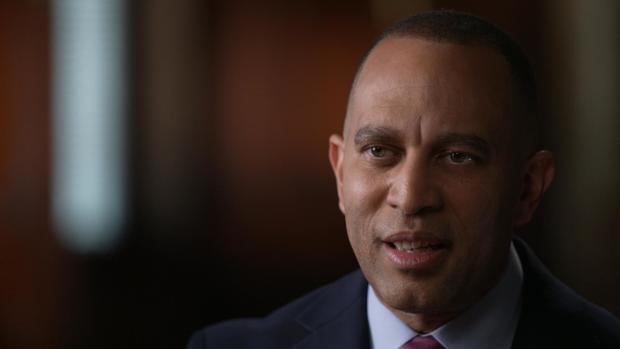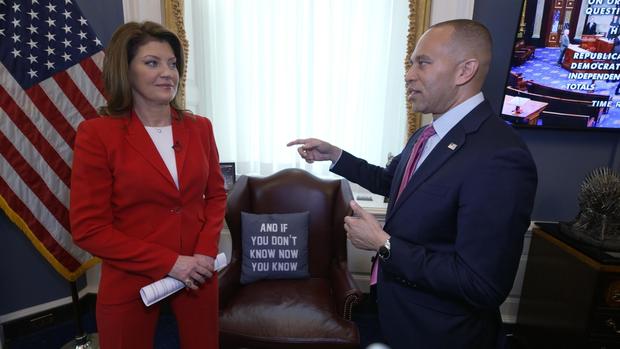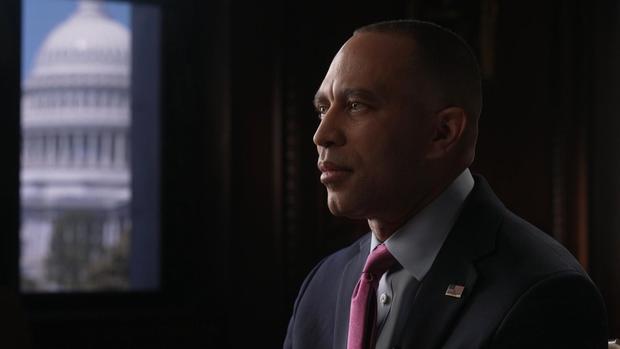House Minority Leader Hakeem Jeffries says Democrats "effectively have been governing as if we were in the majority"
Though they disagree on most issues, House Minority Leader Hakeem Jeffries has opposed efforts to oust embattled Republican House Speaker Mike Johnson.
After Johnson worked with Democrats to pass a foreign aid bill that included $61 billion for Ukraine, Republican Rep. Marjorie Taylor Greene of Georgia, who opposed the bill, said she'd follow through with a threat to remove Johnson by forcing a vote on her motion to vacate him. This past week, Democrats released a statement saying they would oppose Congresswoman Greene's effort to remove Johnson, though Jeffries said Johnson has not asked for his help.
"Our view would traditionally be, 'Let the other side work its own mess out,'" Jeffries said. "But when that mess starts to impact the ability to do the job on behalf of the American people, then the responsible thing at that moment might be for us to make clear that we will not allow the extremists to throw the Congress and the country into chaos."
Division in the House
The United States Congress is not particularly popular these days and it's easy to understand why. The current session will likely be the least productive Congress since the Civil War, in terms of laws passed, according to historical data analysis by J. Tobin Grant, a professor of political science at Southern Illinois University.
Republicans hold the majority in the House, but with only two votes to spare, infighting has crippled their conference. Even some Republican representatives are at their wits' end, including Rep. Troy Nehls (R-TX), who recently told reporters "The Lord Jesus himself couldn't manage this conference."
To hear Jeffries tell it, the Democrats are already in charge.
"Even though we're in the minority, we effectively have been governing as if we were in the majority because we continue to provide a majority of the votes necessary to get things done," he said. "Those are just the facts."
Indeed, in the 118th Congress, House Democrats provided a majority of the votes on bipartisan bills to avert a government shutdown, send aid to Ukraine, and pass the National Defense Authorization Act, which went on to be signed into law by the president.
Jeffries, who represents New York's 8th Congressional District, in Brooklyn, views being a member of Congress as being an emissary of the American people to get things done and solve problems. But he said some Republicans have a different take on the job.
"It's a difficult situation on the other side of the aisle, because many of my Republican colleagues are more interested in creating chaos, dysfunction and extremism," Jeffries said.
Jeffries' stance on Israel — and how it might impact the election
The foreign aid bill passed under Johnson's leadership also includes $26.4 billion to support Israel in its ongoing war with Hamas. Amid protests on college campuses across the country over Israel and Gaza, some far left members of the Democratic caucus have shown support for demonstrators.
In all, 37 House Democrats recently voted against sending more military aid to Israel. The divisive issue will follow Jeffries and President Biden into the election this November, where control of the White House and Congress looks like a coin flip.
"We can't take any vote for granted," Jeffries said. "But I also believe that, at the end of the day, voters are going to look at the totality of circumstances. Who is fighting to deliver for everyday Americans, and who is simply fighting for himself?"
Jeffries, whose district is 11% Jewish, said he supports the First Amendment rights of protesters on campuses, but condemned any form of violence or antisemitism.
He said after the Oct. 7 Hamas attack which sparked the war, Israel had to respond and "decisively defeat Hamas."
"At the same time, my view has been that we have to do everything possible to get the hostages out, and to surge humanitarian assistance into Gaza," Jeffries said.
Jeffries acknowledged that Israel needed to do more to get humanitarian aid into Gaza and that more surgical precision was needed in its military strikes, but he seemed reluctant to criticize Israel.
Senate Majority Leader Chuck Schumer (D-NY) has spoken out on the issue. In a nearly 45 minute speech on the Senate floor in March, he called Israeli Prime Minister Benjamin Netanyahu an obstacle to peace and urged the Israeli government to hold new elections once the threat of Hamas is reduced.
"Anything that Chuck Schumer has to say on the subject is going to be incredibly important and received. But at the same time, every single member of Congress has the responsibility of answering to their constituency," Jeffries said.
He added that any suggestions by Republicans that Schumer, a staunch supporter of Israel, was somehow undermining the U.S.-Israel relationship are ridiculous.
Issues facing voters at the polls: Immigration, abortion, guns and the economy
Closer to home, voters are concerned about the influx of migrants; Jeffries' home city of New York is a hot spot for immigration issues. Shelters to house thousands of migrants have gone up in and around Jeffries' district in Brooklyn.
"We have a broken immigration system and we have clear challenges at the border that we have to confront decisively and in a bipartisan way," Jeffries said. "And the American people are crying out for us to do something about the situation at the border in a manner consistent with our values."
Jeffries also views abortion rights as a major issue in the upcoming election.
"Extreme MAGA Republicans have set in motion the erosion of reproductive freedom. We're going to fight for it with everything that we've got at our disposal," he said. "If Roe v. Wade can fall, anything can fall. Social Security can fall. Medicare can fall. Voting rights can fall. And God help us all, but democracy itself can fall."
Jeffries also pointed toward Democratic legislative wins during his wide-ranging discussion with CBS Evening News anchor and 60 Minutes correspondent Norah O'Donnell. Though CBS News polling earlier this year found two-thirds of voters think the economy was better under former President Donald Trump, Jeffries said the view is inaccurate.
"We have to do a better job of laying out the facts," he said. "That the economy has dramatically improved under the leadership of President Joe Biden."
There are challenges that remain when it comes to lowering costs, ending price gouging, growing the middle class, keeping communities safe and solving problems at the border, Jeffries said.
"We're on the right side of those issues," Jeffries said. "And we just have to make sure we make that case in a compelling, a clear, and a comprehensive way to the American people."
Asked by O'Donnell if he admits Democrats hadn't done that yet, Jeffries smiled. "It's a work in progress," he said.









